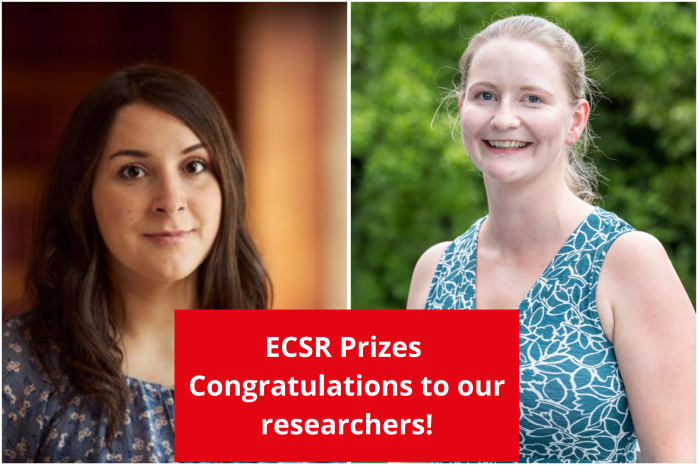
At the European Consortium of Sociological Research (ECSR) conference in Barcelona on 12-14 September 2024, two LIVES researchers won prizes for the excellence of their work. We would like to warmly congratulate Drs García Sierra and Morris on their valuable work, which has been recognised at one of the world's leading sociology conferences.
- Alicia García Sierra - best ECSR doctoral thesis in 2023: "Three Novel Mechanisms of Intergenerational Transmission of (Dis)Advantages"
- Katy Morris - Runner-up for best article in the European Sociological Review 2023. Where DESO Disappears: Spatial Inequality and Social Stratification at Labour Market Entry, Katy Morris, European Sociological Review, Volume 39, Issue 1, February 2023, Pages 85-103, https://doi.org/10.1093/esr/jcac027
Interview with the two researchers
Could you tell us a little about your research/paper?
Alicia: The ECSR Dissertation of the Year Prize was awarded to my PhD thesis, "Uneven Pathways: Three Novel Mechanisms of Intergenerational Transmission of (Dis)Advantages," which I defended at the University of Oxford and Nuffield College in December 2023. My research aims to deepen the understanding of socioeconomic inequalities in children’s development by exploring three innovative mechanisms through which advantages and disadvantages are transmitted across generations. Grounded in a dynamic perspective on social reproduction, each mechanism is analyzed in the context of either the UK or the US, providing what I consider insights into the persistence of inequality over time.
Katy: At country-level, a host of evidence suggests that social origins remain an important determinant of occupational attainment at labour market entry and beyond. Even when two young people have the same qualifications, the one from a more advantaged background will typically achieve better labour market outcomes. But what is true at country-level is not always true below country-level. Local labour market opportunities vary considerably between different localities within countries like the United Kingdom and Germany - how much does this affect the degree of inequality between young people with the same qualifications but different social origins?
Using British and German panel data, I find that there are no meaningful social origins difference in youth labour market outcomes in strong labour markets, where jobs are plentiful. However, who your parents are assumes greater importance as local labour market conditions deteriorate: in weak local labour markets, non-graduates are approximately 16 percentage points less likely to find employment if their parents are care workers rather than secondary school teachers, while graduates typically obtain lower status first jobs.
***
How did you feel when you got the award?
Alicia: I felt very honoured and surprised. I know many colleagues and fellow PhD researchers who have produced exceptional theses, and I’m fully aware of how challenging it is to achieve this kind of recognition. I also felt very lucky to be able to celebrate this moment in Barcelona, surrounded by so many good friends who were attending the conference.
Katy: Surprised and delighted! Often article prizes are based on self-nominations; this particular prize is open to every article published in European Sociological Review in a particular year. European Sociological Review is one of the leading sociology journals so there would have been a lot of excellent competition.
I was particularly pleased because I suspect it's the first article with a spatial component to win an ESR prize. Spatial inequality - the focus of my research - used to be a very niche pursuit within the field of stratification sociology but interest has grown considerably in recent years and that's lovely to see.
***
Is there a specific project that is now special to you?
Alicia: I’m currently working as a postdoctoral researcher on the EQUALOPP project, and I’m excited about the opportunities for growth this position provides. I believe it's a privilege to contribute to a project while also having the time to advance and work on my own research agenda.
Katy: My research focuses on the social and political consequences of spatial inequality, so I investigate the effects of spatial inequality on a range of domains including labour market outcomes, health and wellbeing, inequality perceptions and political beliefs.
In ongoing work with colleagues from University College London and the University of Konstanz that is part-funded by the LIVES Young Scholars fund, I am fielding survey experiments to establish whether and how much correcting misperceptions of position within the local and national income distribution affects meritocratic beliefs, perceptions of inequality and redistribution preferences. Usually, people are asked only where they think they fall within the national income distribution. People are notoriously bad at estimating this, but local income distributions can bear no resemblance at all to the national average. In the United States for example, national median household income was $74,755 in 2022 but ranged from $33,125 in Lowndes county (Alabama) to $122,488 in Alameda county (California).
In shifting consideration of the accuracy of individual perceptions from the national to the local level in two countries with large spatial inequalities and showing the effect of correcting misplacement in both the national and local income distribution, we hope to contribute important new insights into the role of local contexts in shaping socio-political beliefs and preferences. This is my first survey experiment project and I have learned a huge amount from working on it. I'm very grateful to LIVES for the funding that makes this possible.

